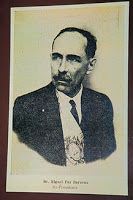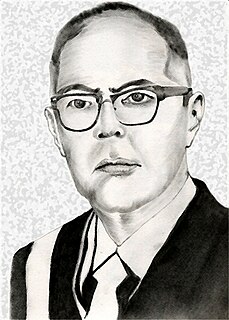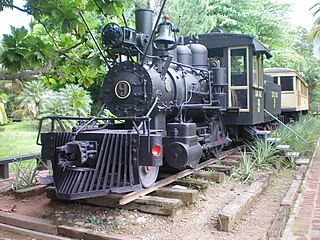 |
|---|
| This article is part of a series on the politics and government of Honduras |
Legislative |
Judiciary |
|
General elections (Spanish : Elecciones generales de Honduras de 1923) were held in Honduras between 27 and 29 October 1923. [1] Tiburcio Carías Andino won the presidential election with 47.1% of the vote. [2] However, as no candidate had received an absolute majority in the public vote, Congress would vote on the candidates. However, Congress did not meet again until 1 January the following year. [3] In December President Rafael López Gutiérrez declared a state of siege, suspended the constitution, and announced that he would remain in office in order to keep the peace. [4] Although Congress was dominated by the two liberal parties, they did not want Carías, but also could not agree on a common candidate. [5]

Spanish or Castilian is a Romance language that originated in the Castile region of Spain and today has hundreds of millions of native speakers in the Americas and Spain. It is a global language and the world's second-most spoken native language, after Mandarin Chinese.

Honduras, officially the Republic of Honduras, is a country in Central America. In the past, it was sometimes referred to as "Spanish Honduras" to differentiate it from British Honduras, which later became modern-day Belize. The republic of Honduras is bordered to the west by Guatemala, to the southwest by El Salvador, to the southeast by Nicaragua, to the south by the Pacific Ocean at the Gulf of Fonseca, and to the north by the Gulf of Honduras, a large inlet of the Caribbean Sea.

Tiburcio Carías Andino was a Honduran military man with a reputation as a strongman. He founded the National Party of Honduras in 1918, and was President of Honduras twice; briefly in 1924 and from 1933 to 1949.
Contents
As a result, Carías started a civil war in February, known as the War of Revindication. López Gutiérrez lost the support of his party in several provinces. [6] Scattered fighting took place over two months, with 400 American marines occupying Tegucigalpa. [7]

The United States of America (USA), commonly known as the United States or America, is a country composed of 50 states, a federal district, five major self-governing territories, and various possessions. At 3.8 million square miles, the United States is the world's third or fourth largest country by total area and is slightly smaller than the entire continent of Europe's 3.9 million square miles. With a population of over 327 million people, the U.S. is the third most populous country. The capital is Washington, D.C., and the largest city by population is New York City. Forty-eight states and the capital's federal district are contiguous in North America between Canada and Mexico. The State of Alaska is in the northwest corner of North America, bordered by Canada to the east and across the Bering Strait from Russia to the west. The State of Hawaii is an archipelago in the mid-Pacific Ocean. The U.S. territories are scattered about the Pacific Ocean and the Caribbean Sea, stretching across nine official time zones. The extremely diverse geography, climate, and wildlife of the United States make it one of the world's 17 megadiverse countries.

Tegucigalpa, colloquially referred to as Téguz, is the capital and largest city of Honduras along with its twin sister, Comayagüela.




